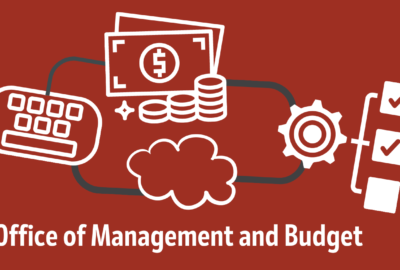Why the government should use more shared services to reduce costs
The GAO says the government wastes billions and billions of dollars on duplicative and overlapping activities, and can help stop the waste with shared services.
The Government Accountability Office (GAO) recently reiterated something it has been pointing out for years: The government wastes billions and billions of dollars on duplicative and overlapping activities. The Federal Drive with Tom Temin‘s guest says the GAO overlooked a crucial way to stop the waste, namely shared services. Steve Goodrich is the Chairman of the Shared Services Leadership Coalition.
Interview Transcript:
Tom Temin The Government Accountability Office recently reiterated something it’s been pointing out for years. The government wastes billions and billions on duplicative and overlapping activities. My next guest says the GAO overlooked a crucial way to stop the waste, namely, shared services. The chairman of the Shared Services Leadership Coalition, Steve Goodrich, joins me in studio now. Steve, good to have you in.
Steve Goodrich Thanks, Tom. And thanks for having me.
Tom Temin And just briefly, tell us about the coalition. You’ve been around for more than last week?
Steve Goodrich I certainly have. I’ve been around government working on these kinds of reforms for over 40 years. The Shared Services Leadership Coalition was formed to specifically focus on shared services and improving the efficiency and effectiveness of government founded by John Marshall.
Tom Temin And John is still around.
Steve Goodrich He’s our president and CEO.
Tom Temin And the idea of shared services goes back. Well, I mean, there’s the National Finance Center and places like that, that go back generations, really of government, but it was called lines of service, I think. Lines of business. That’s correct. In the George W. Bush administration as a way when electronic government started really becoming something of a thing, and government was going online. Why do you think there has been not so much progress in expanding shared services?
Steve Goodrich Lines of business.
Tom Temin And I would think in some ways, shared services would be more efficient now than in the past. If you take something like the National Finance Center, and its counterparts, these are big buildings with capital expenditure and data centers that have to be updated. It’s expensive to operate. Whereas it could all be in the cloud now, where the government pays for it, it still could be a shared service, but without all the capital infrastructure needed.
Steve Goodrich There needs to be a real focus on building the infrastructure required to get there. There’s nobody in charge. There’s nothing statutory about shared services. And it needs to be brought together. I mean, it really started with a push in the Reagan administration. But every administration has had it, it’s been part of the President’s management agenda in the past, but it hasn’t quite gotten legs yet. Because it is an investment and a transition that has to take place. Well, not only in the cloud, but you have a real opportunity to reduce the number of platforms around government. And with the advent of generational AI, bots, the advanced technologies that are out there, there’s tremendous opportunity for cost savings, efficiency and effectiveness with shared services.
Tom Temin Now, some agencies do share services, and you’ve got some examples of where it’s working and the savings have been documented.
Steve Goodrich Oh, sure, absolutely. So if you look at NASA, for example, they’ve saved over $200 million in putting together a shared service. They actually borrowed about $40 million to put it together and paid that back within just several years. You know, almost 90% of large corporations in the private sector are doing shared services now. You know, Johnson and Johnson has saved, with only 150,000 employees, has saved almost $2 billion now.
Tom Temin That’s a lot of shampoo.
Steve Goodrich That’s an awful lot of shampoo. You’re absolutely right. So there’s great opportunity for government to do this right.
Tom Temin And if you look at NASA, what services do they share, and with whom? Or is it among the centers of NASA that had been duplicating the same thing?
Steve Goodrich Well, NASA is primarily within the walls of NASA. So they’re doing HR and IT and finance and and those kinds of things. You also have, you mentioned NFC, which is external, if you will, in the Interior Business Center, supporting other agencies, PSC at HHS, Arc at Treasury. You have a number of them. They haven’t all yet been required to measure their performance, and that’s absolutely a critical element. You know, Commerce has enterprise services, you know, DoD has defense. So we’ve made, for example, with payroll, you know, back in the early 2000s, when it was reduced from 26 payroll centers to four, over $1.6 billion was saved in doing that. And it’s not just about the money, it’s real opportunity to consolidate and reduce the number of technology platforms we have.
Tom Temin We’re speaking with Steve Goodrich. He is chairman of the Shared Services Leadership Coalition. And it’s not like this is totally unfamiliar to government in the larger sense. I’m thinking of the Bureau of the Fiscal Service. Otherwise, you’d have every agency with a checking account. But no matter who you have been paid for in the government, your check says Treasury.
Steve Goodrich Your check all comes through Treasury. Payroll comes through four centers. So whether you’re talking HR procurement, IT services, financial services, imagine consolidating and reducing the number of platforms the number of resources required and getting better service. As we all know, this government is overspending and constantly. Now, I get it. No Congressman has ever gotten elected saying, I’m for shared services. That just doesn’t get votes. It’s not the sexy stuff. But the opportunity to increase government performance, serve the mission of agencies and save a heck of a lot of money is there.
Tom Temin Well, that’s right, too, and even though it’s not a subject of interest in the parades and the speeches back home, Congress nevertheless deals with thousands of such items as it is. Nobody back home on the congressional trail of reelection would be excited by 99% of what’s in the defense authorization bill, for example. All those 800-series provisions on procurement, yet Congress does those. So it seems like they could take on shared services, even though it’s not exciting, because of their track record with a thousand other things that aren’t exciting.
Steve Goodrich They could, and you know, Congress is very good at looking at individual agency budgets. They’re not very good at looking cross-government. And that’s where we need to focus them. That’s where we need some statutory requirements to get there. And that’s where we need a person, an individual with the accountability and responsibility and authority to make this happen across government. Those are the things that are missing.
Tom Temin And what would a statute cause to happen, do you think?
Steve Goodrich Well, one, it’ll make it mandatory, because as I said, it’s not a mandatory factor now. Two, it’ll provide the resources necessary to make the transition from here to there. And, like anything else, an investment is required. But we need to do the analysis. We need to put the business model together. And we need to identify what the ROI is, and demonstrate to the government that is possible.
Tom Temin Because mandatory is easy to say, but what exactly would be mandatory? Payroll? Or, I mean, we’d have to specify what services need to be shared, and among whom, wouldn’t it?
Steve Goodrich We do, and I don’t think we boil the ocean. You know, I think we establish shared service for a clear definition of what it is, making it mandatory. And then let’s start with one, develop the business model, make the adjustments that are necessary, and then start migrating that model from line of business to line of business.
Tom Temin And is there one particular service that you think is particularly ripe for being the guinea pig?
Steve Goodrich Well, I think there’s a number of them that are ripe, you know. Procurement would work, you can do something small, like travel management. HR is the one a lot of people go to, but it’s very complex. I think we should be working on that. And there are folks like at OPM who are working on building the foundations out for the marketplace, the standards, things like that are getting there, as well as for, you know, grants is another possibility, to really push on grants. Again, you don’t want to boil the ocean, because you want to get this right. And make sure, you know, in Washington, you know, our memory fades after a number of years. We need to keep it in the limelight. And our policy recommendation is to establish a role in GSA at the commissioner level, to have the authority to pull this off and make it happen.
Tom Temin Because they used to have GSA consolidating all of the information technology procurement. And if you wanted to do it as an agency, you had to get that delegation.
Steve Goodrich Correct.
Tom Temin So that went away, I think, when the Brooks Act was repealed.
Steve Goodrich Yeah, you know, it happens in different ways, because agencies still have the focus and the authority to do what they want, when they want to do it. And so, you know, GSA can come out with a new, great, really efficient procurement vehicle, and agencies can choose to use it or not. Okay. And that’s part of the mandatory part. But there has to be a migration, and this is a 10 to 15 year migration to make it work.
Tom Temin Are there any members that are sympathetic that you kind of leverage into the rest of Congress?
Steve Goodrich Well, I think the oversight committees in both Houses are interested in this, as well as, you know, appropriations and budget. They want to figure out how to use shared services to create the efficiencies. And, you know, the TMF, the Technology Modernization Fund, allows for shared services, in fact, specifically states that will support shared services. It hasn’t to date, but there’s real opportunity, because the investment for this isn’t just Congress appropriating funds, and absolutely getting a return. You do have TMF. You do have the savings by not investing in all the many systems that the agencies are asking for right now. Give them the band-aids and paperclips right now, but pull money from existing opportunities in the budget. You know, the TMF and other areas, even customers can help support this and it won’t cost a whole heck of a lot and there is a return.
Tom Temin Steve Goodrich is chairman of the Shared Services Leadership Coalition. Thanks so much for joining me.
Steve Goodrich You’re welcome.
Tom Temin We’ll post this interview along with a link to more information at federalnewsnetwork.com/federaldrive. Subscribe to the federal drive wherever you get your podcasts.
Copyright © 2025 Federal News Network. All rights reserved. This website is not intended for users located within the European Economic Area.
Tom Temin is host of the Federal Drive and has been providing insight on federal technology and management issues for more than 30 years.
Follow @tteminWFED






